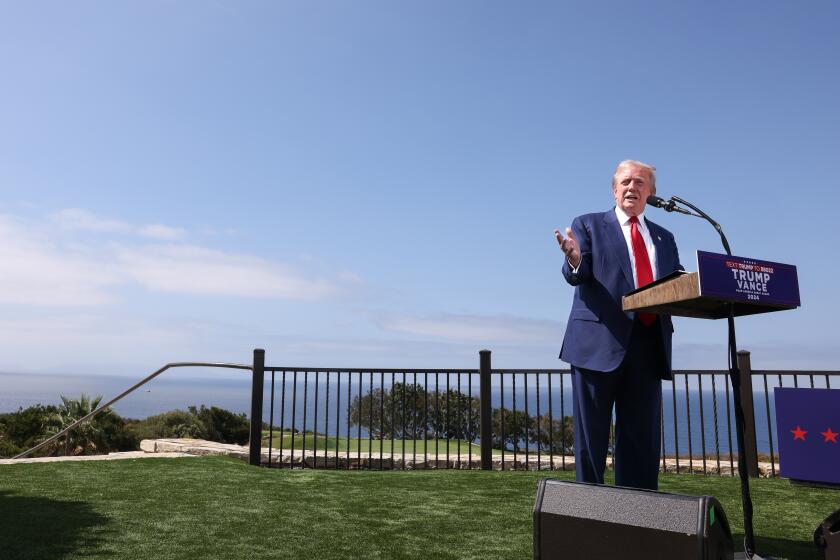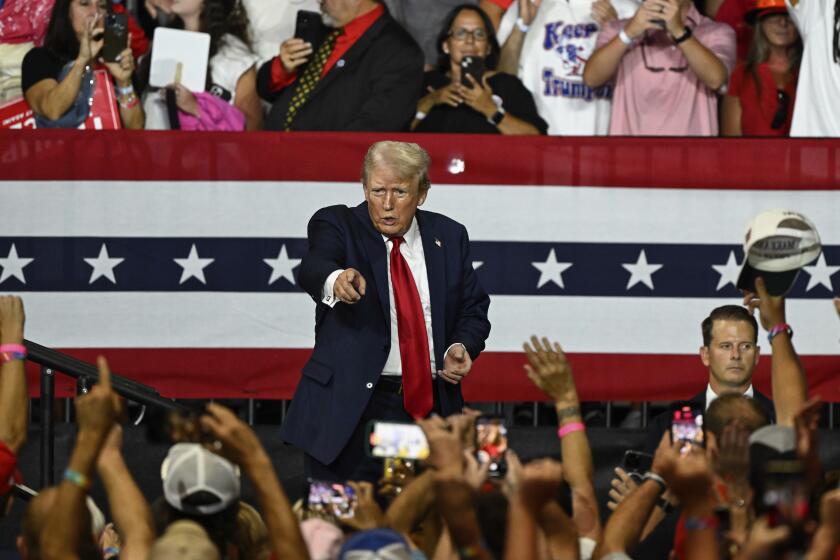Why Republicans Should Love Unions
If Republicans were true to their stated principles of smaller government, free-market economics and the “ownership society” touted by President Bush, they would do something quite alien to their traditional practice: They would support the spread of labor unions instead of trying every trick to foil workers’ efforts to organize.
Unions have almost disappeared from the private sector, where they represent merely 7.9% of workers. Government employees are better organized, at 36%, but overall union membership in the country has fallen to its lowest level since the Depression -- about 12.5% of all workers, a steep decline from 35% half a century ago.
This makes pro-business conservatives happy, but it shouldn’t, because it throws a monkey wrench into the machinery of capitalism.
Republicans who believe that the source of economic well- being is the private sector, not government programs, cannot shrink government in a just way until the private sector functions well for workers at the bottom rung of our society. That won’t happen until employers pay higher wages and benefits. They won’t do that until the market requires it, and the market won’t make that demand until workers can level the playing field with their employers through collective bargaining. A marketplace works freely only when both sides of the transaction have negotiating power.
Plain, everyday facts subvert the conservative agenda of privatization: Without higher earnings, millions of workers will continue to depend on Medicaid for their children’s health insurance, on food stamps to feed their families and on housing subsidies to bring rent down to manageable levels. Either government pays or private employers pay -- or people go sick and hungry and homeless.
Yet the Republican Party, seduced by campaign contributions from big business and the wishful thinking of some theorists, marches in near total anti-union lock step.
Is this really good politics? Would broader unionization help or hinder Republicans at the ballot box?
Unions usually campaign for Democrats. John Kerry won 65% of union members’ votes last November. But a group of congressional members who call themselves “labor Republicans,” mostly from the Northeast, routinely breaks that pattern by supporting unions.
Sen. Arlen Specter won the endorsement of the AFL-CIO last year and got 52% of the union vote in Pennsylvania. He was one of 10 Republican congressional candidates endorsed by the AFL-CIO for supporting a bill to protect workers from harassment and dismissal when they try to organize. The measure -- which didn’t pass but is being reintroduced in the new Congress -- has two main goals. It would stiffen fines against employers found to have harassed employees who wanted to unionize and it would allow for a simpler, faster way for workers to be unionized, replacing all-out, heavily contested elections with a simple “card-check” that recognizes a union if most workers sign up to join. (Elections sound democratic, but they can be delayed by employers to allow time for threats and propaganda. For example, managers have singled out union supporters for extra work, summoned them individually for interrogation and called in police on election day to create an air of intimidation.)
Today, much of organized labor’s decline has resulted from the global outsourcing of manufacturing jobs and the fact that rising service and technology industries are not yet unionized. There is also an out-and-out assault on the already unionized.
Two new Republican governors, Matt Blunt of Missouri and Mitch Daniels of Indiana, suspended collective bargaining by their state employees as soon as they took office in January. Bush has proposed revising decades of Civil Service rules by giving managers enormous authority to set the pay and assignments of federal employees.
Certainly unions are not perfect institutions. When they get too powerful, they can drive companies out of business; there are examples in the newspaper, railroad and airline industries. When they are too weak, they can help their members only marginally. Now, for the most part, unions, such as those among janitors and parking garage attendants, are too weak and too small, giving employers excessive power.
Conservatives should not like this. They should not want the free market to fail millions of the employed. They should not want to lose labor votes. “Whatever party you’re in,” says Andy Levin, director of the AFL-CIO’s campaign to change the federal law on organizing, “if you’re for the robust protections to form unions, we’re for you.” The question is, what are Republicans for -- a free market or a rigged market?
More to Read
Get the L.A. Times Politics newsletter
Deeply reported insights into legislation, politics and policy from Sacramento, Washington and beyond. In your inbox three times per week.
You may occasionally receive promotional content from the Los Angeles Times.








